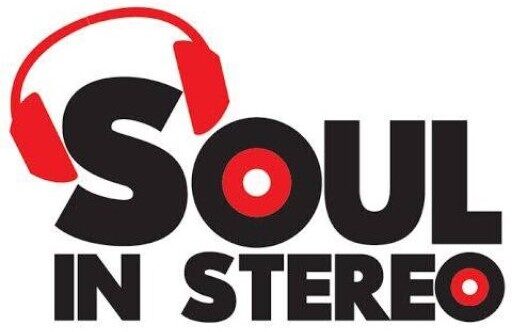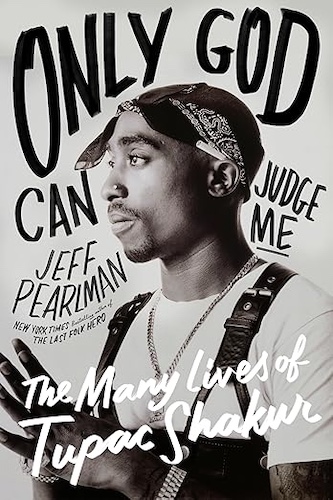SoulInStereo.com has been the home of many debates and hot takes about the career of Tupac Shakur, but there’s always been one point that’s undeniable:
2pac is the most influential rapper of all time. Full stop.
Though his look, his cadence, his activist leanings, his acting aspirations and his outright defiance have been copy/pasted into oblivion by lesser artists over the past three decades, none of them have been able to touch the complexity of Pac’s journey.
Is he a symbol of West Coast rap or an East Coast theatre kid? Is he a broken malcontent or the activist our ailing world needs right now? Does he represent all of hip-hop’s worst instincts or is he a generational poet carved in the image of the civil-rights movement?
If you ask author Jeff Pearlman, he’d probably say that Pac is all of the above.
Jeff’s new book, Only God Can Judge Me: The Many Lives of Tupac Shakur, might be the deepest dive on all things Pac we’ve ever seen. He leaves no stone unturned, conducting nearly 700 interviews and unveiling never-before-heard facts about Makaveli’s journey.
The book drops October 21 – make sure you preorder yours today.
But before you get your hands on it, Jeff stopped by to chat about his All Eyez on Me fandom, the impact of Assata Shakur, Oscar aspirations and Brenda’s actual baby.
Q: Jeff, you’re quite the accomplished author but I believe this is your first hip-hop centered book. How did it come about and specifically, why Pac as a subject?
A: So you’re right. With some exceptions here and there, most of my journalistic career has been sports, and all 10 of my books (before this one) are sports-related. And after a while you do become known as something, and a little bit pigeonholed. But I have many interests other than sports, and I’ve always a) Loved Tupac’s music; b) Been fascinated by his life; c) Wanted to read a genuinely in-depth biography. So, after I learned Kevin Powell wasn’t working on one, I decided to dive in. And here I sit, both elated and tormented.
There have been tons of narratives on Pac over the years. What makes Only God Can Judge unique in its retelling?
I mean, I interviewed 652 people. That’s a start. One thing I’ve focussed upon in my career is reaching out to everyone. E-v-e-r-y-o-n-e. So, for this book, I was the first person to ever interview the first EMT to get to Tupac after he was shot at Quad Studios. I was the first person to track down the actual baby who inspired “Brenda’s Got a Baby.” I flew to Nebraska and was the first person to ever interview his high school girlfriend. I probably spoke to 20 classmates from his freshman year at Dunbar High—and I’m pretty sure most folks have no idea he even went there for a spell. I just dug and dug and dug and dug. Spoke with a ton of dudes who were behind bars with him at Clinton, as well as guards and COs. Found a slew of old girlfriends, found the private doctor who cared for him after he checked himself out of the hospital. Found the first cop to get to the scene—on a bicycle!—in Vegas. I just dug and dug. Tattoo artists, hotel clerks, bouncers. It was a nonstop effort to find everyone.
As most Soul In Stereo readers know, I’ve long had conflicting feelings about Pac. Not so much about his musical impact – that is undeniable. I debate his cultural legacy, where he swings from activist to anarchist depending on who is telling the story. How did you approach that duality?
It’s a helluva question—and a very fair one. One thing I believe it’s very important to remember is he died at 25. What do any of us really know at 25? So I did my best to try and think about him at that age. Young. Learning the world. Discovering self. Also, and this is just the reality: His life was insanely traumatic. Fuck, he was in his mother’s belly was she was in jail. He was raised in abject poverty. Was homeless for a spell. His mother was a crack addict. I’m telling you, people see “Thug life!” Tupac and “I Get Around” Tupac, and it obscures what he often was: Lonely, sad, conflicted, haunted, hurting. He had very few real friends; people who legitimately concerned themselves with his well-being. People were always asking him for money. So, again, it’s important to keep that in mind. This wasn’t a 60-year-old man. He was a kid.
As for “activist to anarchist,” I really believe he was a young man who desperately wanted to do right, but was oftentimes conflicted how to do it. And when to do it. And how to follow through. Perfect example: Thug life. Before singing with Death Row, he swore he was done with all things Thug Life, and that he was going to return to the Black Panther ethos of lifting up people. From all indications, it sounded as if he wanted to return to the spirit of 2Pacalypse Now. But then … Suge. And money. And outside factors. And suddenly he’s recording the ultimate “Thug Life” album, All Eyez on Me. And it’s brilliant. An all-time elite album. But Tupac swore he was done with that—and then he did it. So, hey. It’s bewildering.
I love that book takes a look at Tupac the actor. What do you think is his standout role, and what story does that tell about his legacy today?
Oh, I love this. So obviously Bishop is the character we mostly remember. First, because “Juice” is an iconic film. Second, because the character was just so fucking intense. And third, because Tupac was the elite part of the movie. But for me, his best acting came alongside Tim Roth in “Gridlock’d.” He plays a heroin addict named Spoon, and there are moments of pure brilliance, where he and Roth go back and forth. And Tim Roth is an Oscar-nominated actor. Tupac doesn’t just hold his own—he absorbs the screen. Is the film itself great? No. But Tupac is otherworldly.
As for legacy, he co-starred with Jim Belushi in “Gang Related.” And Belushi told me he thought Tupac was one or two films away from being an Academy Award winner. I agree. Truth is, he had yet to star in an Academy Award-worthy movie. But he would have gotten there.
Without spoiling too much of the book, is there any new or cool fact you uncovered during your research?
There is an abandoned home in North Carolina. No one has lived there in a decade. It’s next to an old church with overgrown grass. On this yard sits Tupac’s tombstone.
You dug through dozens upon dozens of interviews for this project. Are there any names you spoke to that would resonate with us?
I mean, his sister, Sekyiwa Shakur — amazing. His godmother Yaasmyn — amazing. Leila Steinberg — amazing. Tons upon tons of classmates, producers, etc. But if we’re going hip-hop … Money B. Chuck D. Kid, Scarface, Chopmaster J, Daddy Rich, Prime Minister Pete Nice, a bunch of the guys from the Outlawz, B-Legit, Ant Banks, DJ Fuze, DJ Daryl, Lisa Lisa, Ray Luv. On and on. It was a heavy focus on artists who worked directly with him, beginning with his very early days in Baltimore when he identified himself as MC New York and Cassinova Kid all the way through the Death Row end.
The world recently lost activist Assata Shakur, who was not only a motivating figure in hip-hop culture, but also Pac’s godmother. In your eyes, how did her story influence Pac’s?
OK, so this is the thing: People sometimes pay a bit too little attention to Tupac’s roots as a revolutionary. They know his mother was a Black Panther, know he had an early song called “Panther Power,” know he used to sport Afrocentric medallions and such. But I don’t think enough people fully get it. His mom wasn’t merely “a Panther.” She was Afeni Fucking Shakur—the woman who refused a court-appointed attorney to represent herself in the Panther 21 Trial. Without a high school diploma. As she was pregnant. It should be taught in schools across this fucked-up country.
Also, he wasn’t just an appreciator of Assata Shakur. She was a hero. A role model. A beacon of light. And Tupac never even met her. But he learned the stories, and also watched people like his mother, like Yaasmyn Fula, like Mutulu Shakur and used their lives as examples of what it meant to be more than a mere observer as the days pass by. If that makes sense.
Frankly, hip-hop hasn’t always treated its legends well. It only seems to be in recent years that artists like Nas have been able to extend their 90s legacy into modern times. If Pac was still here in 2025, what do you think his role in hip hop would be? How would he fit in?
So first, I wanna make something clear: This is a 100 percent guess. I can’t possibly say what Tupac would have discovered, uncovered, delved into over the last 29 years. But I have a hard time believing that, even at age 54, 2025 Tupac Shakur would be silent as masked ICE agents grab Brown people off the streets. I just … don’t see it. So I think — and, again, this is a guess — he would be a very loud and important leader. Now, in hip hop, it’s REALLY hard to say. If we’re being honest, music — across almost all genres outside of classical — isn’t kind to aging artists. Most become novelties and oldies acts, playing their biggest hits inside 800-seat clubs. Which is a totally legitimate way to make a living. But Jay-Z and Nas are rare gems. Eminem, too. The majority their contemporaries faded long ago. Just because … tastes change, and audiences lean young. So … Tupac? If I had to guess, he’s a two- and three-time Academy Award-winning actor who releases music for his own pleasure.
It’s Soul In Stereo so I have to ask: Favorite Pac album? And why?
All Eyez on Me. First, because it’s just fucking brilliant, and the production value is A++++. Say what you want about Suge Knight (and the book isn’t kind to him), but the man released some one-of-a-kind music. Also, Mad Tupac was a great rapper. You can feel him spitting into the mic. Almost unleashing his insides. The other day, just because I was feeling it, I listened to “Shorty Wanna Be a Thug” about nine times. Even though he recorded it 29 years ago, if you lean in it’s like being there. With Tupac. Every syllable breaking in half and slapping you in the face. I loved it in 1996, I love it even more now.
It’s been almost 30 years since Pac was with us and his legacy is still incomparable. In one word, how would you describe Tupac Shakur the man?
Lonely.
Only God Can Judge Me: The Many Lives of Tupac Shakur drops October 21. Pre-order yours right here.




Leave A Reply